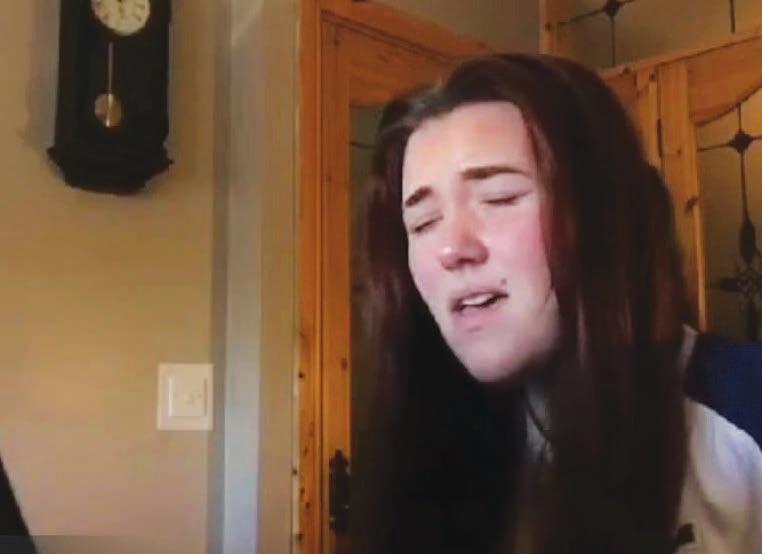
7 minute read
See
Why we need a new word to describe people being old
AS I SEE IT
Advertisement
MARIANNE HERON
MY mother had a great answer for anyone who asked her age in her later years, ” I am as old as my tongue and a little older than my teeth,” she would smile. A good way to avoid disclosing her actual vintage but the answer still didn’t get around that word ‘old’ with all its connotations, most of them negative.
No one really likes to be described as old do they? Our ideas about old age are rooted in the past: take Yeats “When you are old and grey and full of sleep” Hardly in tune with the 21st century when a late septuagenarian like Joe Biden (78) becomes US President and life expectancy is stretching by a whopping three months a year in Ireland.
What can you say instead of old? ere are alternatives like elders, which, in my mind anyway, conjures up a vision of wise old chaps sitting around chewing the fat. Or there is seniors, popular in America but which has a bit of a blue rinse ring about it. Old Age Pensioners OAPs (not only no longer young but past working too,) mature, well good for describing cheese and wine or in France Les Anciennes which sounds positively pre-historic…
Acronyms can be catchy and have a way of shaping our perceptions look at Yuppies, (Young and Upwardly Mobile,) Dinkies (Double Income No Kids) Skiing (Spending the Kids’ Inheritance). Maybe there are possibilities in that line? VOPS Vivacious Older People, TAFS ird Age Folk, HIPEs Have Income Plus Energy or NOATS Not Old At All– maybe not though…
None of the above really sound right for Baby Boomers – those born between 1946 and 1964 who are reaching what is still considered to be old age at 65 plus. is is the generation who never had it so good, who grew up with youth culture and expect life to continue being great.
Apparently, according to surveys in the US at any rate, Boomers think that being old begins much later and they think of themselves as feeling nine years younger than their chronological age. (For me it’s someone 10 years older than I am.)
Over 65s probably think the same way here and there are going to be more of us than ever before: 20% of the population shortly and in another couple of decades one in four will be over 65.
Legislation to change behaviour is becoming fashionable — like proposed tax breaks for environmentally friendly houses and cars – and you could have laws forbidding ageist terminology like referring to oldsters — sorry NOATS — as old farts or similar epithets .
And how about a’me too’ campaign to enforce political correctness around elders, no more giving up your seat on the bus for an old dear (woops!) After all those on the plus side of 65 are becoming a force to be reckoned with at currently 13pc of the population the number is expected to double in the next 30 years, barring a mass exodus of NOATS to sunnier climes.
But what we really need though is a new word which encapsulates the way that ageing has changed, getting on in years no longer means the same as it did back in the day. Whoever thought of spotty youths as a vibrant culture and a lucrative market until someone coined the word teenager?
A national competition might succeed in minting a new expression for NOATS. Meantime I like the idea my niece came up with. I am not an Aunt to her kids, but a Grand Aunt, to shorten things up she simply referred to my husband and myself as e Grands.
And when you think about it those of us who are getting on are grand aren’t we ? Never better. * Marianne Heron is a journalist and co-author of Irish Life’s Rewire Don’t Retire.
Increase in number of refugees to be settled
MORE refugees are likely to be resettled in some counties as part of the Community Sponsorship scheme which empowers members of the public to become a point of contact in their local community and to assume responsibility for providing a range of integration supports to a refugee family.
Minister for Children, Equality, Disability, Integration and Youth Roderic O’Connor con rmed that new groups are now being established in Kildare as well as in Dublin, Meath and Cork and likely Kilkenny and Wexford.
A pilot Community Sponsorship Ireland model was established in December 2018 as an alternative way to resettle refugees in Ireland and the rst candidates were a Syrian family who arrived into Dunshaughlin in Co. Meath.
Following this successful pilot, the Government launched the initiative nationally as a mainstream project in 2019.
To date, 55 individuals or 13 families have settled into 13 different rural and urban communities under this model.
e 13 Community Sponsorship Ireland groups are located across ve di erent counties and new Community Sponsorships groups arrived this year.
A further four families have been identi ed for arrival in the third quarter of 2021 following a selection mission in Greece.
Minister O’Connor said: “An additional 11 Community Sponsorship Groups are currently in formation in counties across Ireland.”
Community Sponsorship is a new way to welcome refugees to Ireland; it is a unique collaboration between Government, UNHCR (the UN Refugee Agency), NGOs and civil society.
Unlike Ireland’s existing refugee resettlement programme, where the State provides integration services directly, Community Sponsorship empowers members of the public who wish to become the face of welcome in their local community and to assume responsibility for providing a range of integration supports to a refugee family. THE prestigious New York based LDM Music Award has been given to young Kilkenny singer-songwriter Gwen Blanch eld.
Her song, ‘You Never Said Goodbye’, fought o competition in the ‘Pop’ category.
Gwen, who was unable to attend the event in person because of Covid19, said:m“We watched a livestream of the ceremony from home. Before they went live they asked all the nominated musicians to submit a video of them performing the song so seeing it being played was surreal. When I was announced as the winner we all screamed.” e song, written and performed by Gwen, is dedicated to the memory of all those who lost their lives to Covid-19.
It undoubtedly struck a chord not only in New York, where people were particularly a ected by the pandemic during its peak, but worldwide.
Gwen comes from a very musical family and always pays tribute to her granddad, an accordion player who died when she was a child.
Last year, her dad Gavin encouraged her to enter the songwriting competition ‘Rockin the Lock-in’ on KCLR.
Her moving performance of ‘You Never Said Goodbye’ was one of the stand-out pieces.
For Gwen, this triumph is one goal achieved of many, and she has since announced that full album is on the way, due to be released within the next few weeks.
Meanwhile, check out www.gwenblanch.com

Our Gwen wins top US music award for Covid-19 song
€255,407 fund will help Watergate eatre reduce its carbon footprint
THE Watergate eatre has been awarded Government funding of €255,407 Mayor of Kilkenny Andrew McGuinness has announced. e funding is being made available under the National Development Plan, Project Ireland 2040. ‘Investing in our Culture, Language & Heritage 2018 - 2027’ sets out the Government’s objectives for capital investment in Ireland’s culture, language and heritage. e Cultural Capital Scheme 20192022 will run until 2022 and will focus on enhancing the existing stock of arts and culture centres throughout the country.
“I’m delighted to welcome this positive news today as the Watergate is such a vital facility in Kilkenny and a major part of our arts, cultural and entertainment o ering,” said Mayor McGuinness.
“ is funding will help to greatly enhance and upgrade e Watergate while also helping to reduce its carbon footprint which is one of the objectives attached to the funding.”
Minister Catherine Martin said: “I am delighted to be in a position to award this funding today to these arts and culture organisations. is capital scheme prioritises projects that reduce an organisation’s carbon footprint.
“ is investment at a range of di erent facilities including arts centres, theatres, galleries, museums, as well as artists’ studios and creative spaces aims to improve the audience and creative experience while upgrading the facilities.
“ is overall funding package will ensure past investment in these arts and cultural centres is protected and sustained,” the minister said.










